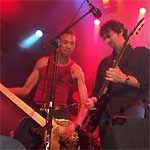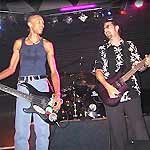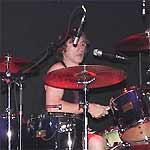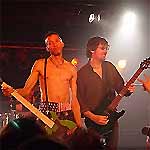| Welcome to the LOUDEST DOT COM ON THE PLANET! | |
 |

|
| Welcome to the LOUDEST DOT COM ON THE PLANET! | |
 |

|
Exclusive! Jeff Kerby's Interview With Ty Tabor of King's X By Jeff Kerby, Contributor Saturday, September 20, 2003 @ 3:28 PM
 Their latest album, Black Like Sunday is a collection of songs written primarily between Ď80 and Ď83. The selections were never recorded at that time, yet fans continued to remember some of these works from the groupís early live shows where the band was energized by the collegian-fueled music scene of Springfield, Missouri. In this setting the groups were able to experiment with their own musical boundaries wherein audiences accepted local bands without requiring that they rely primarily on riffing ZZ Top covers or jamming out to ďSmoke On The Water.Ē It was a time and an atmosphere of creativity where band members consistently came up with new material for inclusion into their repertoire which, of course, mandated that one of their older songs to be left behind. The contemporary feel of Black Like Sunday is either attributable to their recent recording of these older songs or the bandís innovative vision decades agoóin either case, the record is yet another achievement for a group that has continually put auditory growth over formulaic drivel.
At the time of this interview, Ty had just stepped inside after working out in the yard like any other good Texas homeowner. His position as the guitarist for Kingís X has doubtlessly afforded him the opportunity to showcase his influences which range from Mississippi bluegrass to the Beatles to Ace Frehely. If his status in rock music hasnít exactly afforded him the type of material lifestyle that many others currently enjoy, Tyís contentment is remains evident nonetheless. In a society where affluence in no way insures any type of meaningful bliss, being in a rock band that is both satisfying artistically as well as being lucrative enough to pay the necessary bills is still pretty damn cool.
KNAC.COM: Was it more of a shock or a validation for Kingís X to get voted as one of the most influential bands of all time?
Their latest album, Black Like Sunday is a collection of songs written primarily between Ď80 and Ď83. The selections were never recorded at that time, yet fans continued to remember some of these works from the groupís early live shows where the band was energized by the collegian-fueled music scene of Springfield, Missouri. In this setting the groups were able to experiment with their own musical boundaries wherein audiences accepted local bands without requiring that they rely primarily on riffing ZZ Top covers or jamming out to ďSmoke On The Water.Ē It was a time and an atmosphere of creativity where band members consistently came up with new material for inclusion into their repertoire which, of course, mandated that one of their older songs to be left behind. The contemporary feel of Black Like Sunday is either attributable to their recent recording of these older songs or the bandís innovative vision decades agoóin either case, the record is yet another achievement for a group that has continually put auditory growth over formulaic drivel.
At the time of this interview, Ty had just stepped inside after working out in the yard like any other good Texas homeowner. His position as the guitarist for Kingís X has doubtlessly afforded him the opportunity to showcase his influences which range from Mississippi bluegrass to the Beatles to Ace Frehely. If his status in rock music hasnít exactly afforded him the type of material lifestyle that many others currently enjoy, Tyís contentment is remains evident nonetheless. In a society where affluence in no way insures any type of meaningful bliss, being in a rock band that is both satisfying artistically as well as being lucrative enough to pay the necessary bills is still pretty damn cool.
KNAC.COM: Was it more of a shock or a validation for Kingís X to get voted as one of the most influential bands of all time? TABOR: I think the word ďshockĒ would be pretty accurate. We were wondering what we were doing even being mentioned. We couldnít believe it. KNAC.COM: Were you surprised because many of the other groups included on that list are associated with having sold tons of records? TABOR: Well, I just think you never think of yourself that way -- no matter what. Then, like you said, there are just so many bands out there who have sold so much. It was just an honor, and then it was also an honor to realize why we were being included.  KNAC.COM: Since it could never be said that Kingís X is an image driven band, wouldnít it just have to be a matter of reverence and respect from all the right places?
KNAC.COM: Since it could never be said that Kingís X is an image driven band, wouldnít it just have to be a matter of reverence and respect from all the right places? TABOR: Anything that ever comes for us in the way of respect or something always causes us to feel honored. Truthfully, weíve never considered ourselves the greatest musicians in the world or anything like that. We just really enjoy making music together and we enjoy making records and playing live. We feel pretty lucky anyway, so any time some recognition comes our way, weíre just honored. KNAC.COM: I know that you had to sift through a lot of material in order to create Black Like Sunday -- did any of that put your senses back into a particular time? Maybe the time in which you wrote it? TABOR: No, because truthfully, weíve been away from these songs long enough that it was more like being reminded of the songs. It was kind of like as if someone was hearing them for the first time. It was like you would hear it and be surprised by what you heard because maybe you didnít remember how the song went. You get a real and true reaction to the material that you didnít get before because maybe you were too close to it. For us, it was just a blast because we found ourselves listening to it and getting real excited by it. We really started thinking that maybe some of the best stuff we wrote happened during the first seven years of the band. KNAC.COM: What would attribute something like that to? TABOR: I think itís just the first record syndrome that happens with most bands that didnít happen with us at all. What I mean by that is that most bands are together for two or three years, and then they get their record deal, and they make an album out of the songs that theyíve been writing for those two or three years, so that they can pick the best stuff they can. When we got together, we played for years together all over the country. It was seven, almost eight years, before we made our first album. We had a lot of time to write hundreds and hundreds of songs and play them all over and get reactions from people about them. When it came time for us to make our first record, it was almost overwhelming in our case because of all the material. We just made the decision at that time to just go forward and go with what was most current and then continue writing new material. We just didnít glean our songs from the past like other bands do. This was just kind of our chance to make the album that our old fans thought would be our first -- and the album they wanted, naturally. Thatís kind of the way we viewed this anyway.  KNAC.COM: It took a lot of the pressure off when it came time to make the second record, didnít it?
KNAC.COM: It took a lot of the pressure off when it came time to make the second record, didnít it? TABOR: Yeah, because we just wrote new material and just kept on going. Iím really glad we didnít use the older material on that first one for another reason tooówhen we went to record these songs after all this time, we got to record it with whatever it is weíve learned along the way as musicians, as players and as recording people. We are now getting to represent these songs in a decent manner rather than some old crappy tape. That was pretty exciting. KNAC.COM: How hard was it for you to know when to take your hands off this material and not change the way it was originally written? TABOR: Our goal was always to keep it as close to its original writing as possible where we could stand it. What I mean is, if there was one line or note here or there that has always bothered one of us, we might go in there and change that one line or note. The songs in generalóhonest to Godóare a pretty true representation of how they were written with the parts that were written at that time. It is about 95% or more the same. One day, we were sitting around listening to this stuff, we just said to ourselves, ďCrap, this kinda sounds like what is going on right now.Ē Of course, itís 23 years later, but maybe if we threw it out there now it would have a chance to be heard rather than justÖ gawked at as something bizarre. KNAC.COM: Would being in a band like Kingís X actually work against you when trying to market a song that might be considered simple or structured? TABOR: I think that only within the hard-core metal world would you see that type of a thing. The fact is that Kingís X in all other musical worlds outside the hard-core metal world has been kind of expanding. Weíve been growing little by little to the point where we have a large group of newer fans that comes from a different place. Most of those people arenít your metalhead type people. They are bit more eclectic or even bizarre, and even though some of them will listen to the really, really heavy stuff, it has to be interesting to themónot just the same old, same old. It just seems like our fan base has been evolving over time. We had done a lot of opening slots over the last year and were introduced to many more people. To them, itís kind of like this is a new album from a new band. Thatís the type of reaction weíre getting. KNAC.COM: Do you think the fact that you are so experimental with your music ultimately helps you or hurts you as far as keeping new fans?  TABOR: We hate to lose fans at any timeólet me be clear on that. Weíve had fans way back from before we first got signed that are still with us. Many have every record we released and are there at every show. We find that just phenomenal. They are just a core element that makes it so fun for us to go out ever night. You know, but there are a few of the fans from the early days who donít take change very well and who wish we would keep releasing the same record over and over again. Some of those drop off every once in awhile, so when I say some of our old fans leave, I donít say that flippantly. It just sometimes happens no matter what we do. As long as new fans keep coming in, it makes us continue to feel relevant and valid and keeps us going.
KNAC.COM: Would you say that is the primary factor in what has kept Kingís X going all this time?
TABOR: We hate to lose fans at any timeólet me be clear on that. Weíve had fans way back from before we first got signed that are still with us. Many have every record we released and are there at every show. We find that just phenomenal. They are just a core element that makes it so fun for us to go out ever night. You know, but there are a few of the fans from the early days who donít take change very well and who wish we would keep releasing the same record over and over again. Some of those drop off every once in awhile, so when I say some of our old fans leave, I donít say that flippantly. It just sometimes happens no matter what we do. As long as new fans keep coming in, it makes us continue to feel relevant and valid and keeps us going.
KNAC.COM: Would you say that is the primary factor in what has kept Kingís X going all this time? TABOR: Weíve just always had this blindly stupid belief in ourselves and the belief that no matter what things like, that weíd still hang in there until things got better. Itís a roller coaster ride that is nothing to get freaked out about. A lot of bands get some success, and then when it starts to go the other way, they freak out because it didnít just keep going to the part where theyíre Led Zeppelin. That just doesnít happen. Weíve just always been good enough friends that we knew weíd never give up during one of those down times. KNAC.COM: You guys spend a huge amount of time on the road whether you are experiencing a down time or not, yet you have to consistently draw people in order to continue play. How difficult are the economics of the road? TABOR: Oh, of course you have do be doing reasonably well. For example, a band doing a club tour needs to make at least four grand a night to break even. Thatís even if youíre carrying the minimal stuff that weíre carrying. Thatís just what you have to do to stay out there. Thatís just for a band that carries a minimal amount of stuff like we do. KNAC.COM: As a supporting act on say, the Dio tour, is it hard to make that kind of money? TABOR: No, youíre never going to make as much money playing in an opening situation than you would if you were going out on your own. Thatís the general rule of the industry. Thereís a lot of opening slots, and a lot of people want those slots. You donít have to give them much to do it because people just want to go before new people. Thatís really important. In general, doing those kinds of things, you lose your shirt. Thereís gotta be some kind of help along the way. KNAC.COM: Do you guys find that you have an advantage over other bands when it comes to garnering opening slots because of your reputation?  TABOR: Well, I donít know. I just know that some good things have come our way. Weíve been real lucky about it. We usually charge a lot more for opening slots than other bands do, too. You would think that it would be harder for us to those slots because of that. Given that, we feel real fortunate that situation worked out for us. I could name several bands that sold a lot more records than us, that I know personally charge half of what we do. The fact that we could get spots over any of those bands is amazing. I think we just appreciate our situation more than those bands who get too much success too early.
KNAC.COM: It must speak a lot about how the people in the music industry perceive you. Recently, when Kingís X toured with Dio and Hammerfall, did you feel as though your band fit right in on that bill? How hard would it be to make a band as diverse as yours feel uncomfortable?
TABOR: Well, I donít know. I just know that some good things have come our way. Weíve been real lucky about it. We usually charge a lot more for opening slots than other bands do, too. You would think that it would be harder for us to those slots because of that. Given that, we feel real fortunate that situation worked out for us. I could name several bands that sold a lot more records than us, that I know personally charge half of what we do. The fact that we could get spots over any of those bands is amazing. I think we just appreciate our situation more than those bands who get too much success too early.
KNAC.COM: It must speak a lot about how the people in the music industry perceive you. Recently, when Kingís X toured with Dio and Hammerfall, did you feel as though your band fit right in on that bill? How hard would it be to make a band as diverse as yours feel uncomfortable? TABOR: Well, the thing is, we brought a little of Europe over to America because thatís what itís really like over there. I mean, weíve been touring over there since Ď88 with people like Anthrax and Maiden. Talk about high energyóthey were just unbelievable. Everyone was. It was like they were on top of their game, and you would have thought that their audience, and their fans, would have thought we were just lame and wouldnít go for the harmony and stuff, but the truth is, the audience was amazing. They were totally open, cool and great. We learned early on that we could pretty much play in front of anyone. Sometimes it will work, sometimes it wonít, but weíll at least give it a try. KNAC.COM: How does that affect you though when youíre trying to road test songs as you said before? TABOR: Itís real hard to explain, but it takes us very little time to know what we need to change the next night when we do another show opening for someone after weíve just played for their crowd for the first time. Itís really difficult to explain, but itís a matter of energy. You can just tell when youíre connecting and whether or not youíre reaching them on that level that they dig or not. Itís basically just kind of a feel thing. The next night things usually work better because the first night we just do a set that we do for the crowd of a band that we havenít played with before. At that point, we just have no ideaóitís just hit or miss. We throw out what didnít work and go with what did and take that direction and go. Usually by the second or third night, itís kicking. KNAC.COM: What do you see in a given audience during a particular song that contributes to you deciding to axe a particular song or go with a different one? TABOR: The fact is, you could be doing a song, and it goes to a part where you feel the bottom drop out of the room. Thatís the best way to explain it. You just feel the loss of connection, and you realize that the crowd isnít up for that particular thing and that theyíre up for something else. Thatís when you look for something else to connect with them, and you give them that instead. KNAC.COM: I could understand a musician knowing that a certain song isnít working, but to realize that a certain part of a selection isnít going over is pretty interesting. TABOR: Yeah, itís just that different parts create a different vibe. If a certain vibe is a miss with that particular crowd, then it just is. KNAC.COM: You also recently toured with Joe Satriani where many in the crowd would be content to listen to him solo for four hours just for the technical proficiency involved. Do you think that you fall more in with that crowd than that of an audience for a metal band like Hammerfall?  TABOR: I donít think we fall into anything. Wherever weíre put, weíll always be the oddballs on the bill. Thatís just always been our life, and we accepted that at this point. Weíre fine with that. The fact is, we have some musician friends out there in that crowd who dig us for some reason. Itís all about exposing yourself to new people who donít normally show up to your shows. As long as you can do that, then you can gain one or two more fans here and there and it just spreads. Itís the new fans who tell their friends and get excited. Getting in front of them at all is the whole point. Somebody out there is going to connect with what you do even if you get up there and yodel.
KNAC.COM: As a guitarist, do you see the guitar as an instrument that works for the song, or have you ever been at a point where you thought that you needed to put added emphasis on solos?
TABOR: I donít think we fall into anything. Wherever weíre put, weíll always be the oddballs on the bill. Thatís just always been our life, and we accepted that at this point. Weíre fine with that. The fact is, we have some musician friends out there in that crowd who dig us for some reason. Itís all about exposing yourself to new people who donít normally show up to your shows. As long as you can do that, then you can gain one or two more fans here and there and it just spreads. Itís the new fans who tell their friends and get excited. Getting in front of them at all is the whole point. Somebody out there is going to connect with what you do even if you get up there and yodel.
KNAC.COM: As a guitarist, do you see the guitar as an instrument that works for the song, or have you ever been at a point where you thought that you needed to put added emphasis on solos? TABOR: I think I work primarily off vibe. I think we all do actually. We are about as non technical as three people can be. Itís all about how it feels. Whether there need to be more of me in a particular song isnít something that I think about at all. I try to think more in terms of what a song needs and go from there. Itís mostly just about looking for the feel. KNAC.COM: Does it make it easier to find the feel when you have three people willing to explore any given musical direction and arenít necessarily committed to just one style? TABOR: I just think we are who we are because of what we bring to the table. That sounds pretentious and important, but the truth is that we are just three different guys from three different areas. It took us awhile to learn to communicate, but we always had this connection musically where we knew when something worked and when something didnít. That is so rare when you find people that you lock together with in that way and who just see it the way you do. Finding each other like that was the major draw. Those differences and influences making us the multicultural band that we are definitely make for a weird soup, but it seems to work for us. (Photos Courtesy of KingsXonline.com)
| |||||||
|
|
| Recent Features |
 |